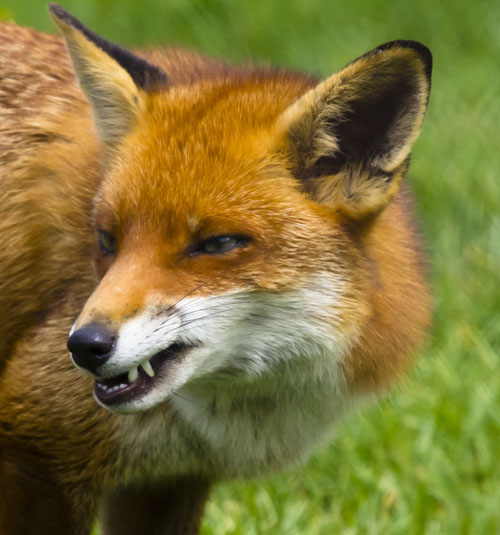The fieldsports community warned of fox attacks, says James Marchington, but was shouted down by ‘animal lovers’ in denial about the nature of these ruthless predators
You have to feel sorry for whoever is in charge of PR for foxes.
They spend months crafting an innocent, fluffy image for the hooligans. It can’t be easy, what with them living it large all night, crapping in doorways and keeping folk up with their screaming and casual sex. To top it off they are riddled with disease and do unspeakable things to pet rabbits.
Somehow the fox PR machine manages to excuse their ASBO behaviour. They don’t know any better, you see. They’re just doing what comes naturally. It’s their countryside and we came and built our houses all over it. They just want to be left alone to get on with their happy, fluffy little lives. Ooh, look at this little one, isn’t he so cute?
And then one of them goes and bites off a baby’s finger. It’s as if one of Max Clifford’s celebrity clients had been caught at a children’s party with his trousers round his ankles. How do you put a positive spin on that?
They tried. In the face of a splash of headlines, such as “Fox did this to my baby”, the fox apologists fought back. Professor Stephen Harris blamed wildlife programmes for encouraging townies into trying to tame the foxes in their gardens. “Foxes take it for granted that they can go into other people’s houses and have a mooch around,” he said on BBC Radio 4’s Today programme.
Nine months ago Prof Harris was spinning a different line in defence of the urban fox, blaming the hunting lobby for a devious anti-fox campaign. He cast doubt on the widely reported case of twins attacked by a fox in Hackney, saying: “Much about this incident puzzles me. Their injuries were unlike anything I have ever seen from foxes.”
He rubbished the idea that babies were at risk. “The first claim that foxes will kill a baby appeared in the Sunday Times in 1973: Forty years on, this still has not happened,” he wrote in the Guardian last June.
A few months earlier the Fieldsports Channel had infuriated the fox-huggers with its video of a fox dragging something baby-sized out of a pushchair. It was a dead piglet, but the point was it could have been a baby. Brian May laid into Fieldsports Channel’s Charlie Jacoby on the Channel 4 Foxes Live programme. Ridiculous, he said. It’s a dead piglet. A fox would never attack a human baby.
What, because foxes have a strict moral code about what constitutes legitimate prey perhaps? They understand there’s a line you just don’t cross? Pets are fair game but kids? Oh no, I couldn’t possibly.
Well, on 6 February a fox proved Charlie and the fieldsports community right and Brian May wrong when it attacked a four-week-old baby. Denny Dolan was in his home in Bromley, south London, when the fox bit off his finger. The puncture marks on his face showed that this fox wasn’t just after a finger-sized snack. It had identified little Denny as prey. It was going to carry him off and eat him.
A month-old baby boy in the UK typically weighs around 4kg and is about 54cm long, according to charts issued by the World Health Organisation. Bigger than a rabbit, but no bigger than a good-sized hare or lamb – both of which are readily taken by foxes. Indeed, foxes frequently carry off bigger prey, such as a full-grown Canada goose. A month-old baby would present no problem, and makes a noise very similar to the electronic calls we shooters use to attract the predators.
Of course, we can’t blame the fox. It is a wild animal scavenging for food. That’s what they do, and they don’t go to college to learn about ethics, morals and good citizenship. Protein is protein, whether it comes wrapped in fur, tinfoil or a babygro.
Ironically, ‘it’s not the fox’s fault’ is the argument fox-huggers use all the time. Well, no it’s not, but then we’re not looking to punish foxes, just manage their population to protect wildlife, livestock, pets and now, it seems, our own young as well.
Predators are always a minefield for environmentalists, as TV wildlife presenter Chris Packham discovered lately. He called for a rethink on domestic cats after a US study claimed the pets were one of the biggest threats to wildlife, killing up to 3.7 billion birds and 20.7 billion mammals in the States each year. Predictably, cat lovers hit the roof.
Packham, presenter of BBC Springwatch and a vice president of the RSPB, said there were too many cats in the UK and blamed them for “exacting a demanding pressure on Britain’s wildlife,” killing around 60 million songbirds annually, not to mention other birds and small mammals. He added: “We’ve known for a long time that this is an issue, and the American study is saying something we’ve all been expecting.”
Really? Perhaps he should explain that to the RSPB, which has been happy to bask in the warm glow of his celebrity. It has long been in denial about the impact of domestic cats on wildlife, and they’re still at it. Its website admits cats kill an estimated 275 million “prey items” a year but claims: “Despite the large numbers of birds killed, there is no scientific evidence that predation by cats in gardens is having any impact on bird populations UK-wide.”
In truth, of course, the RSPB would be raising hell if anything else was killing birds on such an industrial scale. But it has nothing to gain, and much income to lose, from a battle with the animal-loving British public.
Packham looks like he enjoys a good spat, but even he might balk at the sheer bile that’s been heaped on New Zealand environmentalist Gareth Morgan for his anti-cat campaign.
He is suggesting on his blog that New Zealanders should lock their pet cats inside, have them neutered, and not replace them when they die.
It’s not just us Brits who are gloriously confused about our attitude to animals. From New Zealand to New York, if you want to avoid a row, steer clear of religion, politics and predators.
James Marchington







Comments are closed